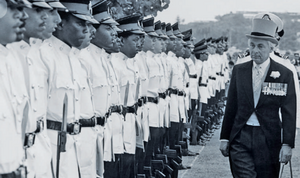FOLLOWING IN the footsteps of Guyana (1970) and Trinidad and Tobago (1976), Barbados became the latest British Caribbean country to become a republic, thus removing the Queen as head of state.
Barbados was the first Caribbean colony acquired by the British empire in 1625 with enslaved Africans and Irish indentured servants shortly following in 1627. It remained one of the most profitable slave-trading colonies and the crown jewel of Britain’s slave-trading monopoly until slavery’s abolition in 1833.
QUESTIONS
Now, as they endeavour to move forward formally cutting ties with Britain, questions may arise over the feasibility of other Caribbean islands receiving their independence.
More specifically, is it time for Jamaica to follow suit and remove the Queen as sovereign head of state? Republicanism is a topic many Jamaican people and those across the Jamaican diaspora in countries such as Britain, Canada and the US subscribe to advocating the removal of Jamaica’s current constitutional monarchy.
The main difference republicanism serves from independence is eradicating hereditary rule, which is apparent through monarchism, the basis is mainly upon rule of law rather than rule of man (king/queen).
The Queen does not have a daily running/interest with Jamaica or any other countries in the Commonwealth (who are not already republics of course). Instead, a governor-general is appointed by the Queen acting as a representative giving formal assent to laws passed. So, in this context, what will republicanism mean for Jamaica?
Foremostly, this allows Jamaica to move forward from the colonial shackles and imperial legacies of the British Empire, giving the people the ability to have supreme power. Slavery and colonialism underpinned the underdevelopment of Jamaica and the economic dependency it has on Britain.
ADMIRATION
In 2021, it is clear to see the colonial nostalgia over the British empire has ended among the Jamaican people. The admiration our elders had for the royal family and the ‘Mother Country’ as it is commonly regarded has not passed to the present generation, with young people becoming more conscious about the histories and atrocities faced by our predecessors.
Serving as a prominent member in the CARICOM, Jamaica holds the largest population of the British West Indies (just under three million) and holds significant political clout in the region.
Nonetheless, the cultural exports of Jamaica through food, music and sports have enabled it to be a popular tourist destination which is instrumental towards the country’s GDP (gross domestic product) and a common dependency for the people.
With Barbados serving as inspiration, the time has come for the Caribbean nations to reconsider their relationship with Britain and move forward having their own sovereignty. The self-determination of Jamaican people has been a long struggle to achieve, and the time may be around the corner.


Comments Form